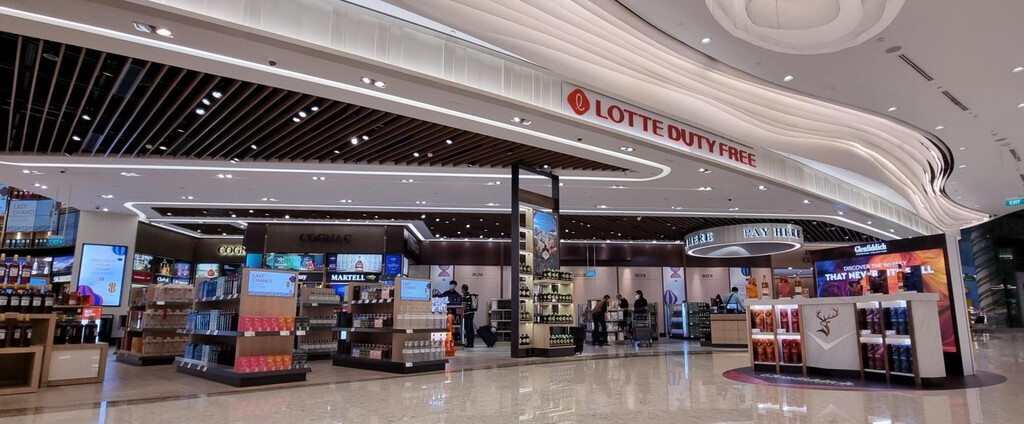
Seoul, South Korea – A positive shift is being observed within the South Korean duty-free industry as Lotte Duty Free has completely ceased transactions with daigou (代工), Chinese personal shoppers who purchase duty-free goods in bulk and resell them in the Chinese market. This move has lessened the intense competition among duty-free operators to attract these bulk buyers, leading to improved profitability for Lotte Duty Free as well as other downtown duty-free stores such as Shilla and Shinsegae. However, the high rental fees at Incheon International Airport's duty-free outlets continue to pose a significant financial burden.
According to industry sources on Monday, Lotte Duty Free officially declared its complete cessation of business with daigou in January. Daigou became crucial for domestic duty-free shops when the COVID-19 pandemic severely curtailed international travel and the number of visiting shoppers plummeted.
Over time, these daigou operations evolved into more organized entities, rapidly emerging as major players in the South Korean duty-free sector. Nevertheless, the escalating competition among domestic duty-free retailers to attract daigou customers resulted in increased discounts and rebate benefits, which became a primary factor in the declining profitability of these businesses.
This context clarifies Lotte Duty Free's decision to entirely halt transactions with daigou, who reportedly accounted for as much as 50% of Lotte Duty Free's total sales. This bold move signifies a strategic commitment to improving long-term profitability, even at the cost of a potential decrease in overall revenue.
Early indications suggest that this strategy is yielding positive results in terms of profitability, despite a reduction in sales volume. Lotte Duty Free has focused its efforts on attracting group and individual tourists as an alternative to daigou. Consequently, at its main Myeongdong branch, the proportion of general group tourists increased significantly from approximately 25% last year to about 55% in the first quarter of this year. Sales from general group tourists also saw a remarkable year-on-year growth of around 200% in the first quarter. Furthermore, sales to general tourists rose by 40%, and sales to VIP invitation customers increased by approximately 95%.
A representative from Lotte Duty Free stated, "While our sales in the first quarter may decrease, our profitability has improved. We anticipate a positive impact on our operating profit in the third quarter when visa-free entry for Chinese group tourists is expected to be permitted, leading to an increase in inbound travelers."
The positive ripple effect of Lotte Duty Free's departure from the daigou market is becoming evident across the broader duty-free industry. The reduced cutthroat competition to attract daigou, coupled with Hyundai Department Store's withdrawal from the downtown duty-free market (Dongdaemun branch), is contributing to improved profitability for other downtown duty-free operators like Shilla and Shinsegae.
However, the substantial rental costs at Incheon International Airport's duty-free shops are projected to hinder profitability improvements. For instance, Shilla Duty Free's airport operations are expected to see a revenue increase of over 10% in the first quarter, but the corresponding surge in rental expenses is anticipated to result in a deficit of around 30 billion won.
Despite these challenges at the airport, the investment sector is showing optimism regarding Hotel Shilla's potential return to profitability starting in the second quarter. 서현정 (Seo Hyun-jeong), a researcher at Hana Securities, noted, "Competition in the duty-free market is easing, leading to improved discount rates. As a result, Shilla Duty Free's downtown stores saw their profit margin increase from a zero-margin level in the fourth quarter to around 5% in the first quarter."
Researcher Seo further predicted that the competitive intensity of the duty-free industry will continue to moderate due to factors such as the prolonged structural decline in duty-free performance, difficulties in expanding new investments in airport duty-free operations, and efforts by major players to improve the efficiency of their sales.
Additional Contextual Information:
Impact of Geopolitical Factors: The article mentions the anticipation of visa-free entry for Chinese group tourists. This policy shift, likely influenced by diplomatic and economic relations between South Korea and China, is a crucial external factor impacting the duty-free industry's recovery. Any changes in these relations or policies could significantly affect the influx of Chinese tourists and, consequently, the sales and profitability of duty-free operators.
Shift in Tourist Demographics: The focus on attracting general group and individual tourists signals a strategic pivot away from the daigou model. This shift necessitates different marketing strategies, product offerings, and customer service approaches tailored to these new demographics. The success of this transition will be critical for the long-term sustainability of duty-free businesses.
E-commerce and Online Duty-Free: The article primarily focuses on downtown and airport duty-free shops. However, the rise of e-commerce and online duty-free platforms is another significant trend in the industry. These online channels offer convenience and broader reach, potentially mitigating some of the reliance on physical store traffic. The strategies of Lotte, Shilla, and Shinsegae regarding their online duty-free presence and integration with their physical stores would be relevant to a comprehensive understanding of the industry's future.
Luxury Goods Market Trends: Duty-free sales are heavily influenced by trends in the luxury goods market, particularly among Chinese consumers who have historically been major buyers. Shifts in consumer preferences, spending power, and the popularity of specific brands can significantly impact duty-free revenue. Understanding these broader market dynamics provides additional context to the strategies employed by duty-free operators.
Regulatory Environment: The regulatory landscape governing the duty-free industry, including customs regulations, tax policies, and licensing, can impact operational costs and profitability. Any changes in these regulations could have significant implications for duty-free businesses.
By incorporating these additional points, a more comprehensive picture of the challenges and opportunities facing the South Korean duty-free industry emerges in the wake of Lotte Duty Free's strategic shift away from daigou.
[Copyright (c) Global Economic Times. All Rights Reserved.]



























